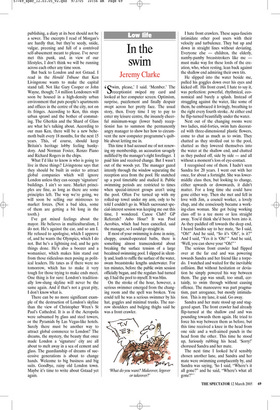In the swim
Jeremy Clarke
‘Swim, please,’ I said. ‘Member.’ The receptionist swiped my card and looked at her computer screen. Optimism, surprise, puzzlement and finally despair swept across her pretty face. The usual story, then. Every time I try to pay to enter my leisure centre, the insanely cheerful minimum-wage (lower band) receptionist has to summon the permanently angry manager to show her how to circumvent the new computer programme’s quibble about letting me in.
This time it had accused me of not renewing my membership, an accusation savagely nullified by the manager’s right forefinger. I paid him and received change. But I wasn’t out of the woods yet. The manager gazed intently through the window separating the reception area from the pool. He snatched up a pool timetable and studied it. Public swimming periods are restricted to times when special-interest groups aren’t using the pool. Often I’ve turned up with my rolled-up towel under my arm, only to be told I couldn’t go in. Which sacrosanct special-interest session was keeping me out this time, I wondered. Canoe Club? GP Referrals? Asbo Hour? It was Pool Aerobics, which had been cancelled, said the manager, so I could go straight in.
If most of your swimming is done in noisy, choppy, council-operated baths, there is something almost transcendental about breaking the surface tension of a large becalmed swimming pool. I slipped in silently and, loath to ruffle the surface of the water, swam breaststroke lengths underwater. For ten minutes, before the public swim session officially began, and the regulars had turned up, I had the pool to myself. It was bliss.
On the stroke of the hour, however, a serious swimmer emerged from the changing room and the spell was broken. You could tell he was a serious swimmer by his hat, goggles and minimal trunks. The narrow shoulders and bulging thighs said he was a front crawler. I hate front crawlers. These aqua-fascists intimidate other pool users with their velocity and turbulence. They bat up and down in straight lines without deviating. Everyone else — children, the elderly, namby-pamby breaststrokers like me must make way for these lords of the creation, who, when resting, lean back against the shallow end admiring their own tits.
He slipped into the water beside me, pulled his goggles down over his eyes and kicked off. His front crawl, I hate to say it, was perfection: powerful, rhythmical, economical and barely a splash. Instead of struggling against the water, like some of them, he embraced it lovingly, breathing to the right every fourth stroke. At either end he flip-turned beautifully under the water.
Next out of the changing rooms were two ladies, mid-forties, swim hats decorated with three-dimensional plastic flowers, come to chat as much as to swim. They chatted as they strolled out to the pool, chatted as they lowered themselves into the water at the shallow end, and chatted as they pushed off, side by side — and all without a moment’s loss of eye-contact.
I recognised one of them. I hadn’t seen Sandra for 20 years. I went out with her once, for about a fortnight. She was lowermiddle class then, but looking to change, either upwards or downwards, it didn’t matter. For a long time she could have gone either way. Then she met and fell in love with Jim, a council worker, a lovely chap, and she consciously became a working-class woman. She got being working class off to a tee more or less straight away. You’d think she’d been born into it. As they paddled off towards the deep end, I heard Sandra say to her mate, ‘So I said, “Oh!” And he said, “So it’s ‘Oh!’, is it?” And I said, “Yes it is ‘Oh!’ ” And he said, ‘Well, you can shove your “Oh!”’ The serious front crawler had flipped over at the far end and was powering towards Sandra and her friend like a torpedo. I watched and waited for the inevitable collision. But without hesitation or deviation he simply powered his way between them. The gap was small, too small, certainly, to swim through without causing offence. The manoeuvre was part pragmatism, part arrogance, but mostly intimidation. This is my lane, it said. Go away.
Sandra and her mate stood up and staggered apart. The front crawler had already flip-turned at the shallow end and was pounding towards them again. He tried to force his way between them as before, but this time received a knee in the head from one side and a well-aimed punch in the head from the other. This time he stood up, furiously rubbing his head. ‘Sorry!’ chorused Sandra and her mate.
The next time I looked he’d sensibly chosen another lane, and Sandra and her mate were swimming complacently by, and Sandra was saying, ‘So I said, “Where’s it all gone?” and he said, “Where’s what all gone?”’
































































 Previous page
Previous page